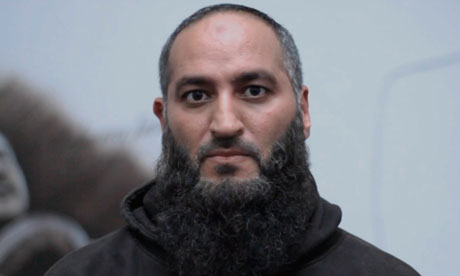By Haroon Siddique - guardian.co.uk
 |
The opening scene in Combinations, a film designed to challenge viewers' assumptions about Muslims. Photograph: Media Cultured
|
The call to prayer sounds and a serious-looking man with a bushy beard stares intently at the camera. At first appearance it is a familiar image of an angry Muslim but as the man breaks into laughter and begins to talk about his pride in being British, the viewer's presumptions are challenged.
When showing the trailer, which is being developed into a short film, Khazir pauses it at different stages, asking people to write down their thoughts before pressing play and highlighting any mistaken conclusions they may have jumped to.
"As a positive role model for young Muslims he [Naeem] is a fantastically credible, practising [Muslim], guy who's part of the community and who also challenges the xenophobic views and discriminatory views of racists who paint us all as one bloc of evil Mullahs," says Khazir. "He's the antithesis of that. We can achieve the same ends with one piece of work. We can reduce extremism, providing positive role models for Muslims and to non-Muslims we can show the opposite of what the stereotypes portray in the media."
Khazir previously worked in PR and internet search engine optimisation when he noticed how videos of jihadis in Iraq and Afghanistan received large numbers of hits. He said: "Young people especially are often recruited and indoctrinated using videos posted on different social media channels – this can be by simply following a Twitter link."
With the longer version of Combinations almost complete, Media Cultured is already planning its next film, Head for Cover, a history of the hijab. "It's not a piece of clothing that's divisive, or causing separation or segregation," says Khazir. "It's actually just a personal freedom, a simple item of clothing which has biblical traditions right from the Jewish matriarchs to Mary."
The clip is a trailer for Combinations, a short film being produced by Media Cultured, a fledgling organisation using film and social media to challenge extremism by and against Muslims. In an age when the Taliban and Somali group al-Shabaab use Twitter, and the anti-Islamic film The Innocence of Muslims on YouTube was disseminated by extremists on both sides to further their own ends, Media Cultured is an attempt to use the same tools to promote harmony rather than discord.
The community interest company in Teesside is the brainchild of director Amjid Khazir, who has been working with local mosques and national faith groups to help the Muslim community understand internet safety and online propaganda. "We are trying to achieve a level of integration and tolerance between communities in an area [social media] that's being ignored by the government," said Khazir. "If you ever wanted to define big society, this is it."
Combinations, made in conjunction with Thousand Yard Films, features Imran Naeem, who runs a boxing gym, is a community volunteer and carried the Olympic torch through Darlington last summer. The title refers to the flurries of punches thrown by boxers as well as Naeem's dual British-Muslim heritage. The trailer has already been shown in one "hard knock" Middlesbrough school, as Khazir describes it, where he says the children's initial perceptions were challenged. He is in discussions to put the film on alongside workshops in other schools, as well as university Islamic societies, mosques and prisons, initially locally and then nationally.
"As a positive role model for young Muslims he [Naeem] is a fantastically credible, practising [Muslim], guy who's part of the community and who also challenges the xenophobic views and discriminatory views of racists who paint us all as one bloc of evil Mullahs," says Khazir. "He's the antithesis of that. We can achieve the same ends with one piece of work. We can reduce extremism, providing positive role models for Muslims and to non-Muslims we can show the opposite of what the stereotypes portray in the media."
Khazir previously worked in PR and internet search engine optimisation when he noticed how videos of jihadis in Iraq and Afghanistan received large numbers of hits. He said: "Young people especially are often recruited and indoctrinated using videos posted on different social media channels – this can be by simply following a Twitter link."
It was the death of his uncle that persuaded him to focus on his community work full-time. Mohammed Zabir, a taxi driver, died of a heart attack in 2011, a month after being attacked by a drunken passenger.
Khazir said: "He was like a father to me. He lived next door to me, I grew up with him … I gave up the job I was doing and thought: 'I am going to make this work.'"
Khazir set Media Cultured up with a bursary from Teesside University's DigitalCity project, which also provides him with an office and mentoring.
No comments:
Post a Comment